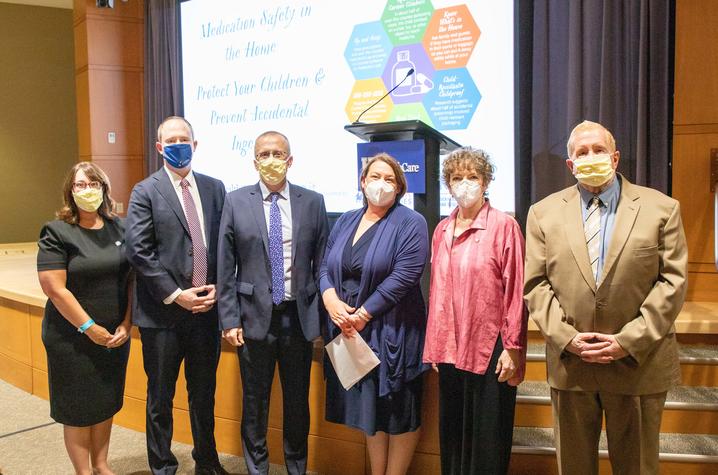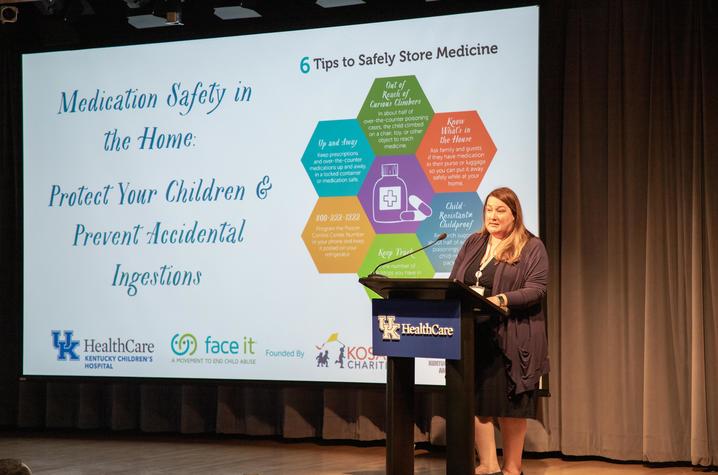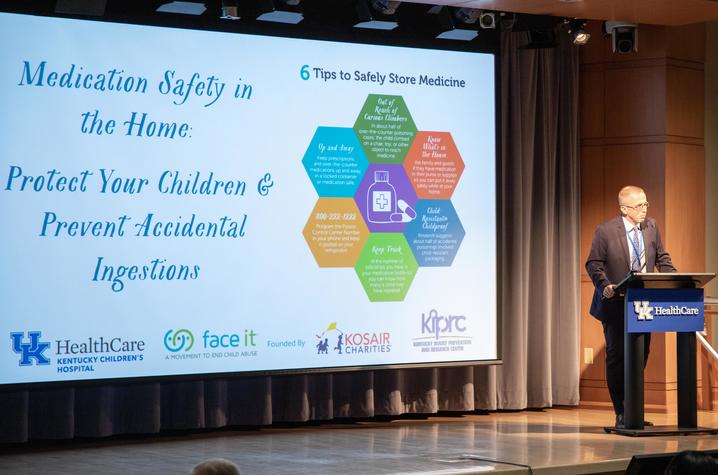KCH, KIPRC and Kosair Charities launch safe medication campaign to protect children
LEXINGTON, Ky. (Aug. 23, 2022) — Every nine minutes, a young child goes to the emergency department because they ingested medicine incorrectly. To bring awareness to the importance of safe medication storage in the home, the Kosair Charities Face It Movement has collaborated with the Kentucky Children's Hospital (KCH) and Kentucky Injury Prevention and Research Center (KIPRC) on a new campaign aimed at preventing these accidental ingestions and keeping children healthy and safe.
Today, state and local leaders joined representatives from KCH, KIPRC and Kosair Charities to announce the new campaign, Medication Safety in the Home: Protect Your Children & Prevent Accidental Ingestions, which offers families and professionals who work with families tips to safely store medicine.
“The 2020 Kentucky Child Fatality and Near Fatality External Review Panel found that nearly one in six of all fatalities and near fatalities were related to the ingestion of substances. But, these horrific accidents are preventable. Families can keep their children safe and healthy with the right tools and resources, including keeping all medications up and locked away and out of reach of curious climbers,” said Christina Howard, M.D., child abuse pediatrician and chief of Division of Pediatric Forensic Medicine at Kentucky Children’s Hospital.
The collaboration has created a new Medication Safety in the Home campaign that includes a print resource, magnet and website. The campaign offers tips to safely store medication, as well as data points that highlight the critical nature of the issue. The six tips include:
- Up and Away — Keep prescriptions and over-the-counter medications up and away, in a locked container or medication safe.
- Out of Reach of Curious Climbers — In about half of over-the-counter poisoning cases, the child climbed on a chair, toy or other object to reach medicine.
- Know What’s in the House — Ask family and guests if they have medication in their purse or luggage so you can put it away safely while at your home.
- Child-Resistant ≠ Childproof — Research suggests about half of accidental poisonings involved child-resistant packaging.
- Keep Track of the number of pills/strips you have in your medication bottle so you can know how many a child may have ingested.
- 800-222-1222 — Program the Poison Control Center number in your phone and keep it posted on your refrigerator.
“We take medicines and vitamins to feel and stay well. However, we know that medicine — both prescription and over-the-counter — can cause harm if taken incorrectly or by the wrong person. To keep our children safe, we all must practice safe storage of all medications,” said Steven Stack, M.D., commissioner of the Kentucky Department for Public Health. “I encourage every parent, grandparent, sitter and caring community member to save the Poison Help number in your phone in case there’s an emergency — 800-222-1222.”
Less than one in four caregivers use safe storage practices for medication at home. To help mitigate that reality, KIPRC and KCH are distributing medicine lock boxes to targeted health care providers across the state. In emergency department visits for medicine poisonings, parents often say they only turned their back for one minute. These medication lock boxes ensure medicine is only accessible to the prescription holder and will help reduce accidental ingestions or misuse of medication. Contact ukpedfor@uky.edu for more information about medication lock boxes available for free in Kentucky.
“The Office of the Attorney General works hard to combat child abuse and the drug epidemic, and this campaign addresses both of these priorities. Being aware of the dangers and methods to prevent children from accidentally ingesting medication is one way citizens, law enforcement, medical professionals and caregivers can protect Kentucky’s children from harm,” said Heather Wagers, Kentucky Attorney General Daniel Cameron’s executive director of the Office of Trafficking and Abuse Prevention and Prosecution.
“Kosair Charities is committed to ensuring families have what they need for their children to grow up healthy and safe from harm,” said Barry Dunn, president and CEO at Kosair Charities, which founded the Face It Movement. “The Medication Safety in the Home campaign is a pivotal next step in the Face It Movement’s efforts to improve child safety, support families and prevent child fatalities in the Commonwealth. We appreciate the strong partnership with Dr. Howard’s team at Kentucky Children’s Hospital and other experts who are championing these efforts to prevent children from accidentally ingesting medicines.”
View the Medication Safety in the Home campaign and additional information and resources at http://faceitabuse.org/safemedstorage. In the event of accidental ingestion of medicine, contact the Poison Control Center Hotline at 800-222-1222 and go to the emergency department nearest you.
As the state’s flagship, land-grant institution, the University of Kentucky exists to advance the Commonwealth. We do that by preparing the next generation of leaders — placing students at the heart of everything we do — and transforming the lives of Kentuckians through education, research and creative work, service and health care. We pride ourselves on being a catalyst for breakthroughs and a force for healing, a place where ingenuity unfolds. It's all made possible by our people — visionaries, disruptors and pioneers — who make up 200 academic programs, a $476.5 million research and development enterprise and a world-class medical center, all on one campus.







